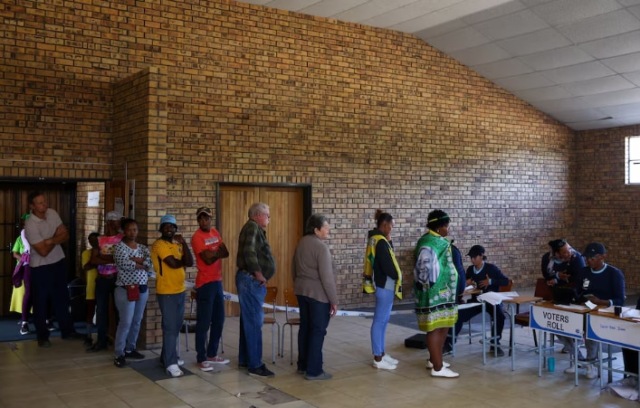South Africans voted on Wednesday in the most competitive election since the end of apartheid, amid high turnout and with opinion polls suggesting the African National Congress may lose its parliamentary majority after 30 years in government.
Well after dark, voters were still forming miles-long queues to cast their ballots. Chief Electoral Officer Sy Mamabolo told a news conference that turnout “will be well beyond the 66 per cent we had in 2019”.
The Electoral Commission said polling stations would stay open for anyone who was in line at the closing time at 9 p.m. (1900 GMT). Two hours later, only 55 per cent of polling stations nationwide had closed.
“We are experiencing a late surge and are processing a large number of votes in certain areas, particularly the metropolitan areas,” Mamabolo said.
Voters cited high rates of unemployment and crime, frequent power blackouts and corruption in ANC ranks as reasons why they would vote for opposition parties.
“I grew up loving the ANC because of how they fought for the freedom we have today. That is why I voted for them all these years,” said business owner Skhumbuzo Mnyandu, 48, who came out to vote in KwaMashu, a township close to Durban.
But this time Mnyandu said he was voting for uMkhonto we Sizwe (MK), a new party backed by former president Jacob Zuma.
Others, however, were wary of change.
Pensioner Charles Louw, 62, said he would remain loyal to the ANC as he distrusted the promises made by opposition parties to create jobs, end power cuts or crack down on crime.

“The ANC have been trying to do it, they are there, they have got experience, they know how to accommodate everything. But the new parties, where will they start?” he said after voting in Alexandra, a sprawling township east of Johannesburg.
Then-led by Nelson Mandela, the ANC swept to power in South Africa’s first multi-racial election in 1994 and has won a majority in national elections held every five years since then, though its share of the vote has gradually declined.
Young voters who did not live through apartheid were particularly disillusioned with the ANC and the country’s economic prospects.
“There’s no jobs for the youth. We have degrees, but there’s no getting jobs,” said Nosipho Mkhize, a 28-year old – the median age in South Africa – explaining why he was voting MK.
If the ANC falls short of 50% this time, it will have to make a deal with one or more smaller parties to govern – uncharted and potentially choppy waters for a young democracy that has so far been dominated by a single party.
Voters are electing provincial assemblies in each of the country’s nine provinces, and a new national parliament which will then choose the next president.

With the ANC still on course to win the largest share of the vote, its leader President Cyril Ramaphosa is likely to remain in office.
More than 27 million South Africans are registered to vote at more than 23,000 polling stations, with voting due to end at 9 p.m. (1900 GMT).
Turnout has steadily fallen since the start of the democratic era and is one of the key variables this time.
The election appeared to be going smoothly in most places, with 93% of polling stations opening on time, according to Masego Sheburi, a senior official at the electoral commission.
Reuters reporters witnessed isolated incidents, such as voters being turned away from a Johannesburg polling station because they were not registered to vote there, and in one Alexandra location voting was delayed for hours due to the late arrival of ballot papers.
‘MOST CONSEQUENTIAL ELECTION’
After voting in Soweto, a huge township outside Johannesburg, Ramaphosa said the ANC had run a strong campaign.
“I have no doubt whatsoever in my heart of hearts that the people will invest their confidence in the African National Congress,” he said.
John Steenhuisen, leader of the pro-business Democratic Alliance (DA) party which won the second-largest share of the vote in the last election in 2019, urged voters to turn out in large numbers to bring change to South Africa.
“This is the most consequential election since 1994,” he said after casting his ballot in Durban.
Other opposition parties hoping to loosen the ANC’s grip on power include the Economic Freedom Fighters (EFF), founded by Julius Malema, a firebrand former leader of the ANC’s youth wing. The EFF wants to nationalise mines and banks and seize land from white farmers to address racial and economic disparities.

“We see ourselves overtaking the ANC, not the DA. The DA is small boys. We have no time for small boys,” a typically combative Malema told reporters as he arrived to cast his ballot in Seshego, in the northern province of Limpopo.
“We’re going for the real giant, which is the ANC. We are in an election to remove the ANC,” he said.
Opinion polls suggest EFF support has been hovering between 10% and 12%, far short of the ANC on 37%-44%, but Malema could find himself in position to be a kingmaker depending on the election results.
Zuma’s new MK party looks set to eat into both ANC and EFF support, especially in his home province of KwaZulu-Natal where he has enduring influence despite being forced to quit as president in 2018 after a string of scandals.
The election commission is expected to start releasing partial results within hours of polling stations closing and final results within three or four days at most.


































